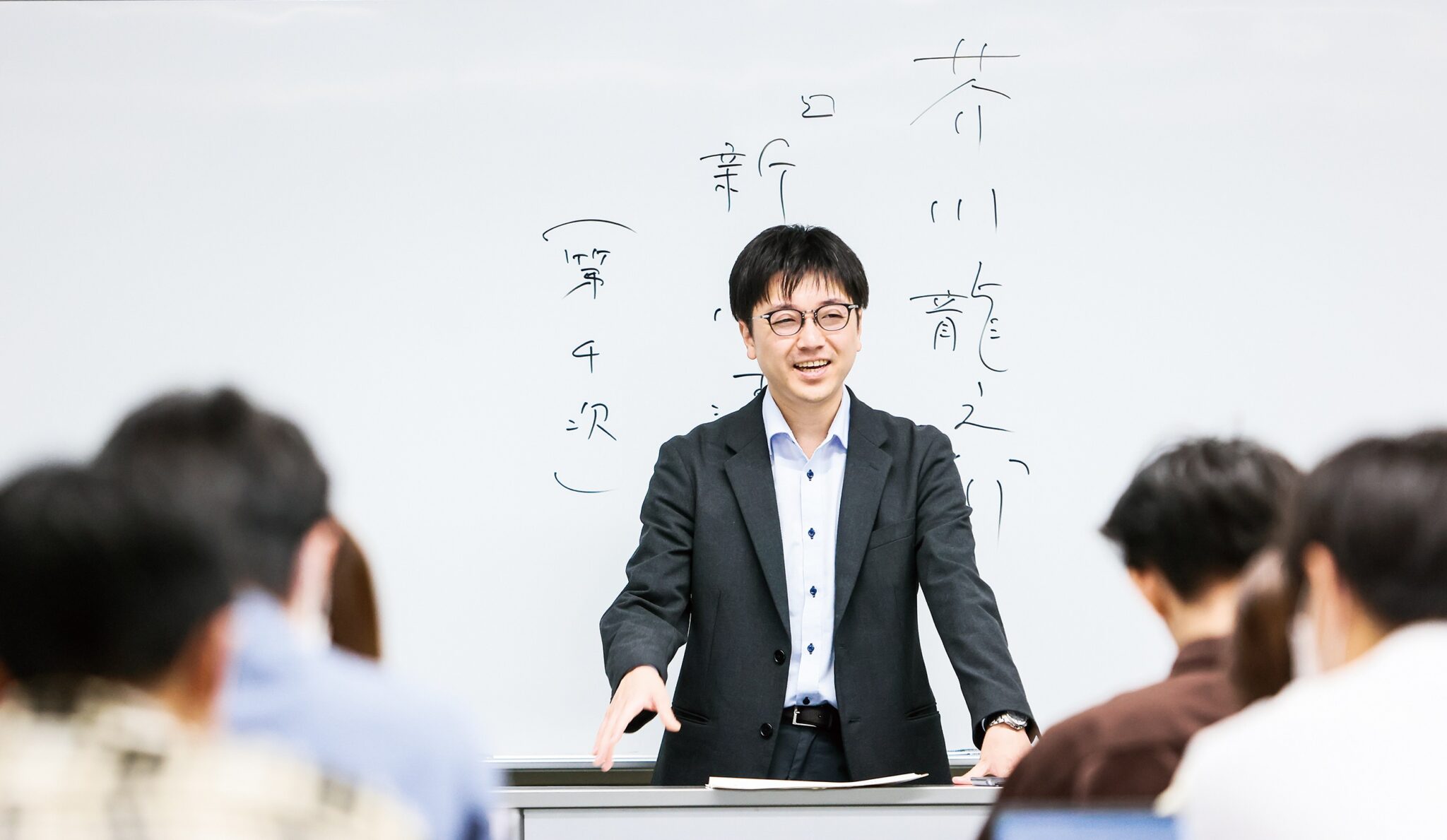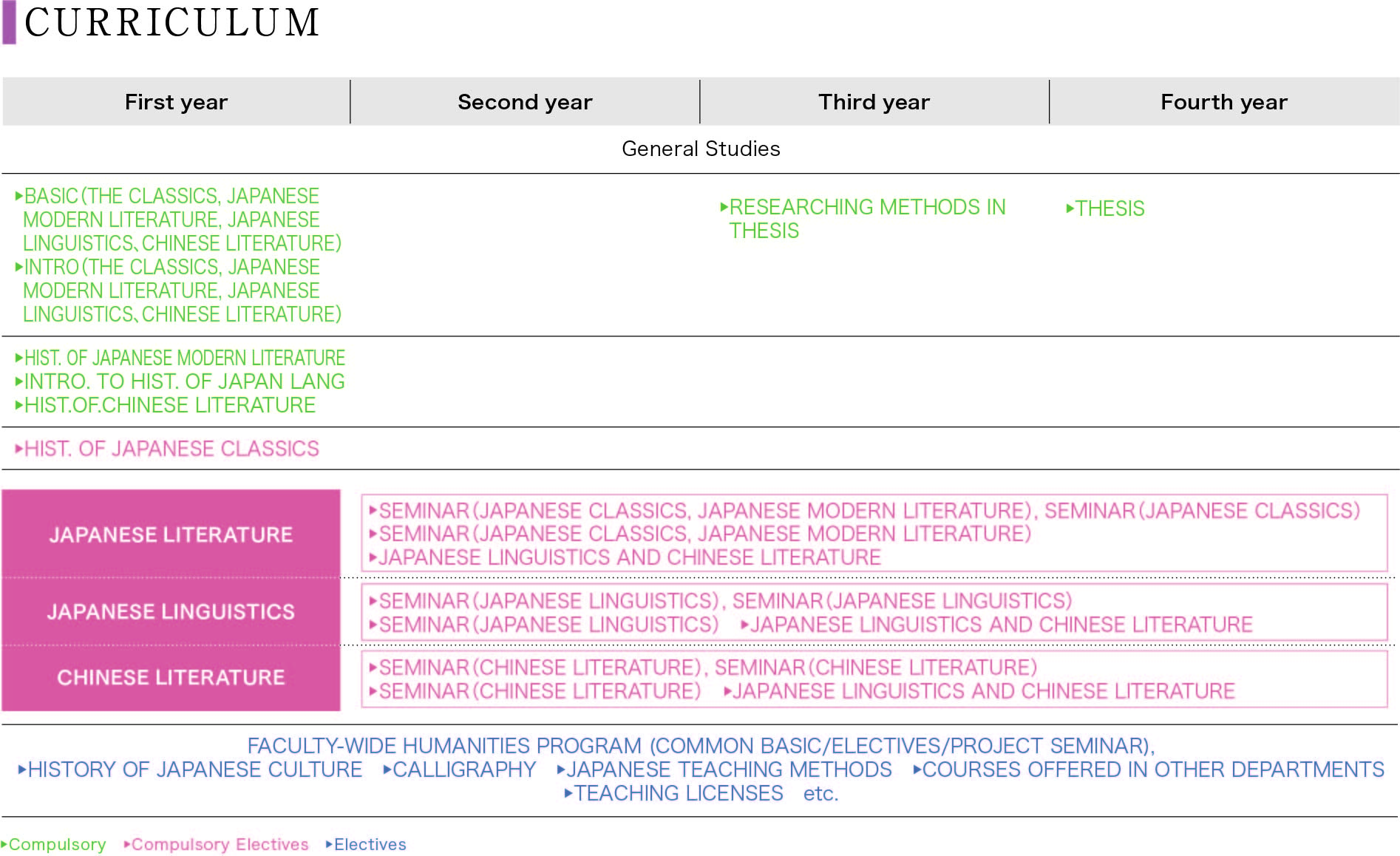Department of Japanese Literature


Department Features
With classical studies as the foundation of its education and research, the department emphasizes the discipline while developing reading comprehension, thinking, and expression skills. As a department that plays a central role in the study of Japanese culture, we aim to cultivate perspectives that question the essence of people, society, and culture, while at the same time reexamining Japanese culture in the context of globalization and acquiring the academic cultivation and insight that will enable us to communicate this to the world. We respect the characteristics of each student, and in order to achieve this, we continue to have small sized classes to enforce students to be self-directed.
The Department of Japanese Literature, which celebrates its 65th anniversary in 2024, will continue its tradition of producing many researchers and educators, and will strive to nurture human resources who will be responsible for the next generation of research and education, combining expertise and interdisciplinarity.
Topics of Bachelor’s project
Each students decide the topic of their Bachelor’s project individually. These are some examples of what you may do from the recent topics:
- Writing “mata” in the Nihon Shoki
Concerning the usage of the four Chinese characters that are read “also” in the Nihon Shoki. We have shown that there are two volumes, one conforming to the Chinese usage and the other to the Japanized usage, and that the editors of each volume differ from each other. Published in the journal of the Association for Japanese Literature, Sophia University, Japan: Thesis on Japanese Literature No. 55.
- Naoya Shiga’s creative attitude
The paper carefully reveals that there are elements of Nietzschean view of man and naturalism in Naoya Shiga’s work, and forces a rethinking of the conventional understanding of Shiga.
- Interpreting Yugao’s waka
The Waka which starts with “KOKORO ATENI” in Genji Monogatari has many interpretations and does not have a concrete one yet. It re-interpretated the song and image of the one who sang, by using existing annotation and Waka.
- Politeness in dependent clauses
When we politely express “iku” as “ikimasu,” do we also add “masu” to “itte,” “ikuto,” and “ikutoki” (subordinate clauses), such as “ikimashite,” “ikimasuto,” “ikimasutoki”? This paper clarifies the unconscious choices we make by tracing documents from the Meiji era onward.
- Medival depictions of mothers
The study included a comprehensive analysis of mothers in military tales, focusing on Tokiyo (mother of Minamoto no Yoshitsune) in the Heiji Monogatari, and clarified the way they thought and lived as mothers, while also reading Buddhist chanting materials (narratives in which the Buddha Dharma is preached to the people).
- Chō Kōran and Tang poetry
The study specifically reveals how Chō Kōran, a well-known female poet of the late Edo period, accepted and created her own poems from the Middle and Late Tang Dynasty in China. Published in Thesis on Japanese Literature No. 52.
Curriculum
Students will find research themes while linking the three fields of Japanese literature, Japanese linguistics, and Chinese literature, and cultivate the ability to solve problems based on new ideas through examining materials, individual analysis, and the pursuit of logic.
In the first year, students acquire basic academic skills and knowledge of Japanese literature, Japanese linguistics, and Chinese literature through basic and introductory courses. From the second year onward, emphasis is placed on learning techniques for conducting research. Another feature of this course is that students can take one course in succession in the seminar and special lecture courses for the second through fourth years. Students spend a long time in the original texts, learning profoundly and extensively, leading to the bachelor’s project to be written in the fourth year.
as of 2022
* Please refer to the syllabus for more information on the courses.
Course Examples
- Reading the Japanese Classics
Through reading “Ise Monogatari” and other facsimile edition books, students will develop the ability to read kuzushiji characters and acquire the ability to read classical works in their original text. Students will gain a deep understanding of the world of these works while thinking about the times in which they were written.
- Introduction to History of Japanese Language
This course outlines the aspects and changes of the Japanese language from the early to the modern era from the aspect of grammar, and clarifies the transition of the Japanese language in a structural manner. Furthermore, we will deepen our understanding of grammar research by reconsidering so-called “school grammar” as a historical entity.
- History of Japanese Classics/ History of Japanese Modern Literature
The primary objective is to acquire a basic knowledge of the historical transition of Japanese literature. Through the reading of works from each period, the differences between classical and modern literature, continuity and discontinuity in Japanese literature, and the relationship with foreign literature will be discussed.
- Seminar in Japanese Modern Literature
Student research presentation as the core of the discussion, with the theme of literary works of the Japanese modern era and its qualities and value. In addition to works by Ryunosuke Akutagawa, Atsushi Nakajima, Kyoka Izumi, Junichiro Tanizaki, and others and other works will be used as subjects.
- Chinse Literature
The course will cover a wide range of works and personalities, from Confucian treatises such as “The Analects” to novels such as “Sanguozhi Yanyi” and even Chinese poetry by Japanese poets such as Lai Sanyang, to study various aspects of Chinese literature, Chinese thought and literature, and comparative literature between Japan and China.
- Research Method in Thesis
Full-time faculty members give lectures on research and thesis writing methods in the form of infusion courses to cultivate a foundation for each student to find their own research direction and issues and work on their thesis in preparation for writing their Bachelor’s thesis in the fourth year.
Available Teaching Licenses and Subjects
- First Category Teaching license for Junior High School (Japanese)
- First Category Teaching license for High School (Japanese)
Curatorial courses are available.
Educational Objectives and Policies
-
As a department that plays a central role in the study of Japanese culture, the department aims to cultivate academic knowledge and insight into the essence of human beings, society, and culture, while developing reading comprehension, thinking, and expression skills, with classical studies as the foundation of education and research based on the organic linkage of Japanese literature, Japanese language studies, and Chinese literature.
-
To cultivate human resources who can contribute to the world of education and research, as well as to internationalization, by emphasizing the cultivation of multilateral ways of thinking that combine expertise and interdisciplinarity
-
In the Department of Japanese Literature, students will study the three fields of Japanese literature Kokubungaku (Japanese literature), Japanese linguistics (Japanese studies), and Chinese literature, regardless of what period or field of study they major in, in order to have the ability to decipher original source materials precisely and to publish their original views convincingly based on solid arguments obtained from such materials. The following abilities and knowledge that students should have acquired at the time of graduation are defined as follows, and upon fulfillment of the graduation requirements, students are recognized as having acquired these abilities and awarded a degree.
- The ability to acquire the skills to accurately decipher pre-Edo period source documents, and to utilize the knowledge of background literary and Japanese language history necessary to do so.
- Understanding of the wood-printed books after the Edo period, modern and contemporary media, and the ability to make sound judgments about the linguistic expressions of each period that depend on these media
- Understanding of the history and characteristics of language works of each period, from the early to the present, based on the original sources, and the ability to discuss the merits and demerits of various academic theories with evidence.
- The ability to master methods for investigating the phonological and grammatical characteristics of the Japanese language of each period based on specific linguistic works, and to present one’s own views based on that investigation.
- The ability to read literary and kanbun texts with an understanding of the history of kanbun reading and the elegance that kanbun expressions have brought to the Japanese language, as well as the skills to read kanbun texts with a taste for kanbun
- Based on the above knowledge and the cultivation of judgment and expression, students will write their graduation thesis and proactively advocate their own views based on objective and steady deciphering of original sources, while maintaining a sense of dialogue and collaboration that does not fall into self-righteousness.
-
In line with the Diploma Policy, the department offer a curriculum that emphasizes precise reading of source materials and incorporates the following objectives so that students can reach the essence of Japanese language and culture through an unbiased study of the three fields of Japanese literature (Japanese literature), Japanese linguistics (Japanese language studies), and Chinese literature.
- To introduce and teach students to accurately decipher pre-Edo period source materials and provide them with the necessary background knowledge of the history of literature and the Japanese language
- To provide students with instruction in the use of post-Edo period woodblock printed book and various modern and contemporary media, and to cultivate the ability to make accurate judgments in relation to the language expressions of each period;
- The students are taught to understand the history and characteristics of the language works of each period, from the early modern period to the present day, based on the original source materials, and to develop the ability to discuss major theories and controversies with evidence.
- To teach students how to investigate the phonological and grammatical characteristics of the Japanese language of each period based on specific linguistic works, and to enable them to present their own views based on this investigation
- To teach the students to acquire the skills of reading Chinese texts, to teach them about the history of reading Chinese texts, and to introduce the elegance that Chinese expressions have brought to the Japanese language, and to have them taste and read Chinese and literary texts.
- On the basis of the above knowledge, judgment, and expression skills, students are required to write their graduation theses, which are based on the objective and steady deciphering of the original texts.
-
In order to understand the traditional Japanese language and culture and the characteristics of the Japanese language, we accept students who are willing to study a rich variety of Japanese language works, including literary works and Kanbun reading in-depth and broadly in the fields of Japanese literature, Japanese linguistics, and Chinese literature, and who have the basic reading skills to do so.
- Students who are interested in Japanese literary works from ancient times to the present day, and who are willing to further develop their ability to read and understand each source material with deeper and more detailed judgment, to discover new independent ways of reading, and to refine them in dialogue with others.
- Students who are interested in the Japanese language, which has consistently been a “national language” from ancient times to the present day, and who are willing to elucidate the structure of the Japanese language on their own initiative, sometimes by comparing it with other languages.
- interested in the Chinese literary style, which has always been one of the foundations in the history of the Japanese language and literature, and willing to further develop their ability to appreciate works in the Chinese literary style.
Faculty Members
Masayuki SEMA Professor
Naoshige NAGAO Professor
Tatsuhiko FUKUI Professor
Youko MOTOHIRO Professor
Hiroshi KIMURA Associate Professor
Takuya FUKUI Assistant Professor
